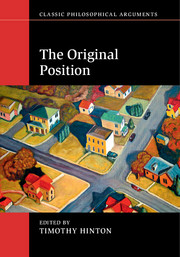Book contents
- Frontmatter
- Contents
- List of contributors
- Acknowledgments
- List of abbreviations
- Introduction: the original position and The Original Position – an overview
- 1 Justice as fairness, utilitarianism, and mixed conceptions
- 2 Rational choice and the original position: the (many) models of Rawls and Harsanyi
- 3 The strains of commitment
- 4 Our talents, our histories, ourselves: Nozick on the original position argument
- 5 Rawls and Dworkin on hypothetical reasoning
- 6 Feminist receptions of the original position
- 7 G. A. Cohen's critique of the original position
- 8 Liberals, radicals, and the original position
- 9 The original position and Scanlon's contractualism
- 10 The “Kantian roots” of the original position
- 11 Stability and the original position from Theory to Political Liberalism
- 12 The original position in The Law of Peoples
- References
- Index
5 - Rawls and Dworkin on hypothetical reasoning
Published online by Cambridge University Press: 05 December 2015
- Frontmatter
- Contents
- List of contributors
- Acknowledgments
- List of abbreviations
- Introduction: the original position and The Original Position – an overview
- 1 Justice as fairness, utilitarianism, and mixed conceptions
- 2 Rational choice and the original position: the (many) models of Rawls and Harsanyi
- 3 The strains of commitment
- 4 Our talents, our histories, ourselves: Nozick on the original position argument
- 5 Rawls and Dworkin on hypothetical reasoning
- 6 Feminist receptions of the original position
- 7 G. A. Cohen's critique of the original position
- 8 Liberals, radicals, and the original position
- 9 The original position and Scanlon's contractualism
- 10 The “Kantian roots” of the original position
- 11 Stability and the original position from Theory to Political Liberalism
- 12 The original position in The Law of Peoples
- References
- Index
Summary
It is a striking fact that the two leading egalitarian liberals of recent times, John Rawls and Ronald Dworkin, deploy hypothetical reasoning in their somewhat different conceptions of justice. As is well known, Rawls uses the device of the original position in which representatives must choose between candidate principles of social justice – in the first instance, between the principles Rawls favors, the two principles of justice, and utilitarianism. Principles of justice, he argues, are those that would be chosen by representatives charged with the duty of securing their clients’ enjoyment of primary social goods while lacking particular information about their clients’ characteristics, including their socioeconomic class, natural talent, sex, race, and conception of what it means to live well. True, Rawls nests what I shall call the original position argument within a more general moral methodology of “reflective equilibrium” in which we reason about political morality by seeking consistency between our abstract and concrete considered judgments about justice in the light of the leading alternative moral theories available to us. However, the original position argument plays a central role in Rawls's distinctive conception of justice, justice as fairness. He recommends the original position as a thought experiment to be used when theorizing the demands of justice. Just terms of cooperation should be viewed as if they stemmed from an agreement between citizens, but the agreement must be one not reached out of fear or because of one's poor bargaining position. The agreement we are after is a hypothetical agreement: an agreement that would be made by representatives in the original position who were deprived of certain kinds of information the use of which would tend to render the agreement unfair.
Dworkin also uses hypothetical reasoning in his account of justice, equality of resources, in the device of the hypothetical insurance scheme. Resources should be distributed equally between citizens, he insists, and once we have an egalitarian distribution of external resources – land and the goods produced from it – we are faced with the question of how we ought to compensate individuals who suffer misfortune in the distribution of internal resources – disability, ill health, or a lack of marketable skills, for example.
- Type
- Chapter
- Information
- The Original Position , pp. 97 - 118Publisher: Cambridge University PressPrint publication year: 2015
- 3
- Cited by

